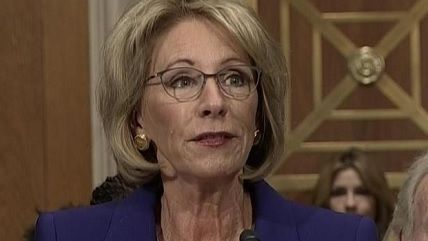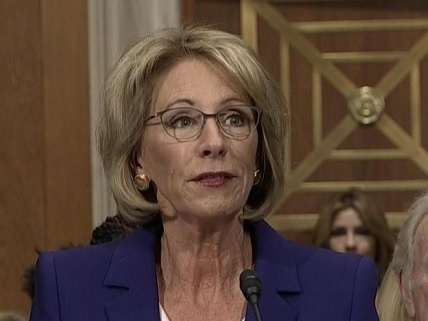NPR Explains How School Choice Might Look Under Betsy DeVos
And it's pretty, pretty good.


The nomination of Betsy Devos to head the Department of Education passed the relevant Senate committee on a party line 12-11 vote, after a brief delay when Democrats objected to Sen. Orrin Hatch (R-Utah) voting by proxy.
NPR has a piece today explaining "how school choice might work" under DeVos, drawing from a ranking by the school choice advocacy group Americans for Children (AFC) which DeVos chaired. The group ranked Florida's school choice program number one in the country, although NPR noted the group only ranked states were students were explicitly allowed to choose religious schools. Later, it explains that according to Florida's school choice scholarship organization, students benefiting from the program are overwhelmingly African-American and Hispanic, and more than 70 percent of scholarship money goes toward religious, predominantly Christian, schools. Denying students such a choice severely limits their opportunities for little discernible reason other than a distaste for religious-run institutions, many of whom serve as important providers in marginalized communities.
Religious schools, Christian and otherwise, have a long history in the United States, including being looked at with suspicion about disloyalty during the xenophobic period surrounding World War I. More importantly, such schools have track-records in the communities that they serve. Comprehensive school choice ought to give parents the opportunity to access a wide array of educational options, including public schools and private schools, magnet schools and charter schools, or even homeschooling.
The competitive pressures all the different educational providers face in an environment of increased choice improves the quality of services and the outcomes across the board. It doesn't mean charter schools, let alone private schools, religious or otherwise, are against public schools, and, despite posturing by teachers' unions, the reverse shouldn't apply either.
Florida's program was ranked number one, NPR reports, because of its "broad eligibility, reaching families with incomes of up to 200 percent of the federal poverty level; for the generosity of the tax break to donors, a dollar-for-dollar match with a cap that increases automatically each year; and for the large size of scholarships, nearly $6,000."
The scholarship program is set up as tax credits and matching programs that permits corporations, other organizations, and individuals to choose to fund private scholarships, thus largely bypassing concerns about "public money" going for religious purposes (although the vast majority of so-called "religious schools," once known as parochial schools, have largely secular curriculums, with components aimed at the religious life of the student that are usually sensitive to children of different faith or even none at all). The objection to religious schools, like the objection to homeschooling, is based on an inaccurate biased belief that these modes of education are somehow inferior or intellectually lacking, as well as an irrational fear of religious organizations and motivations, despite both private schools and homeschooling becoming more popular in large part due to failing local schools.
Opponents of Florida's school choice program, notably, do not specifically claim that the schools at which students use the state scholarship's money are somehow subpar. Instead, when the teachers union and other interest groups sued, they argued the state constitution required "uniform education."
A spokesman for the Florida Education Association (FEA) told NPR that non-public schools Florida students can go to thanks to state scholarship funds "don't have to follow the state curriculum, don't have to participate in testing, don't have to hire certified teachers. They don't have to follow the same rules."
In other words, students are not trapped in the cartel run by the teachers unions and its friends. Students in more states should be so lucky, and NPR is certainly right about looking to Florida as a model. As an expert they spoke to noted, there's little "fungible" money in the federal education budget; Florida's model offers an opportunity to make funds available for school choice despite that challenge—likely DeVos is considering it, but if not perhaps NPR gave her a good idea!


Show Comments (105)